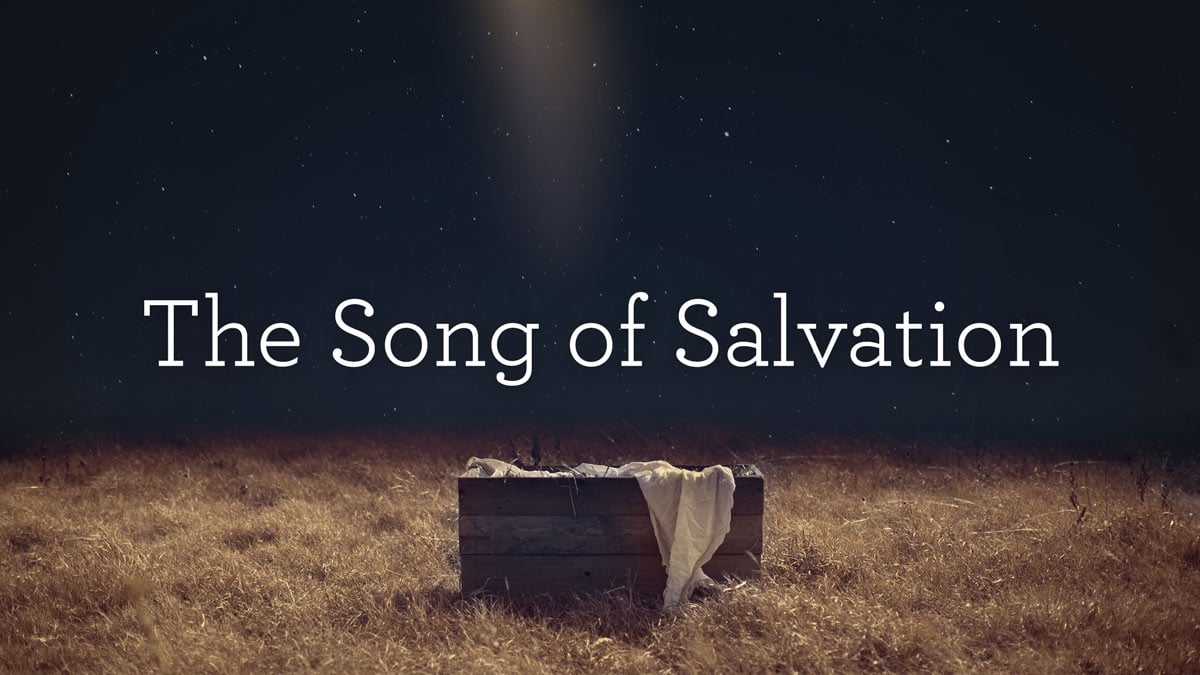
As he recounts the birth of Jesus in his Gospel, Luke records four songs sung in response to the good news. Mary sings, “My spirit rejoices in God my Savior” (1:47). Zechariah blesses God because he “has raised up a horn of salvation … in the house of his servant David” (1:69). The angels praise God because “unto you is born this day in the city of David a Savior” (2:11). And Simeon takes the baby Jesus in his arms and prays to the Father, “My eyes have seen your salvation” (2:30).
The theme of salvation that resounds in these four songs is found throughout Scripture. Noah and the ark, Moses and the exodus from Egypt, Gideon and his depleted little army, Jonah and the whale—these stories all sound with God’s saving power. The Scriptures together sing one supreme song of salvation that is for all peoples, from sin, by grace, and through faith in the Lord Jesus Christ.
Salvation for All People
After Jesus was born, Mary and Joseph presented Him in the Jerusalem temple (Luke 2:22–24). At the temple was Simeon, a “righteous and devout” man who had been “waiting for the consolation of Israel” (v. 25). Taking Jesus in his arms, Simeon blessed God, saying that the salvation Jesus would offer would be “a light for revelation to the Gentiles, and for glory to … Israel” (v. 32).
Simeon’s blessing echoes the angels’ pronouncement at Christ’s birth: “I bring you good news of great joy that will be for all the people” (v. 10, emphasis added). Both of these declarations in turn reach back to Old Testament passages like Isaiah 49:6, in which God had declared centuries prior that He would cause His servant to be “a light for the nations, that my salvation may reach to the end of the earth.”
The Bible’s stories all unite to tell one supreme narrative, to paint a singularly vivid picture, to reverberate with one inimitable melody: salvation for all peoples, from sin, by grace, through faith in the Lord Jesus Christ.
The salvation God offers in Jesus Christ is offered to every nation. No people group is excluded. It transcends racial, social, and cultural barriers. Skeptics may wonder, Why do Christians have to try and make everybody else Christians? The answer is that Jesus has told us to go to the ends of the earth and tell everybody about His salvation—to “make disciples of all nations” (Matt. 28:19). One day, men and women “from every tribe and language and people and nation” (Rev. 5:9) will worship our Lord Jesus Christ together in harmony forever.
Salvation from Sin
If we move back a chapter from Simeon’s song in Luke 2 to Zechariah’s in Luke 1, we find Zechariah exclaiming that John the Baptist will prepare the way for Christ. How? He will “give knowledge of salvation to his people in the forgiveness of their sins” (v. 77, emphasis added).
Scripture teaches that “all have sinned and fall short of the glory of God” (Rom. 3:23)—including all Christians! Some say, Well I do my best. I live by the Sermon on the Mount. I try to keep the Ten Commandments. But even if we consider only the first commandment, “You shall have no other gods before me” (Ex. 20:3), and assess our obedience honestly, we find ourselves to be lawbreakers. We’re all idolaters. We all worship things that crave our attention. In other words, we all have sinned. Even good things can usurp the place God alone ought to occupy.
We can find salvation from our sinful desires in Jesus Christ alone. Sin will always entice and allure us with empty promises. But if God is our desire, our strength, our portion, He is not only mighty to save, but He is more than capable of satisfying the longings of our hearts (Ps. 90:14).
Salvation by God’s Grace
The four songs of Luke 1–2 are about God’s salvation. They praise God for what God has done to save His people; they don’t praise people for doing anything to save themselves. As Mary sings, “He who is mighty has done great things for me” (Luke 1:49, emphasis added).
God’s gift of salvation comes to us all by grace—that is, as a gift. Paul tells us, “By grace you have been saved through faith. And this is not your own doing; it is the gift of God, not a result of works, so that no one may boast” (Eph. 2:8–9). There is simply nothing at all that we can do to atone for either the sinful things we have done or the righteous things we have left undone. The salvation we need can only ever come to us because of God’s grace.
Sin will always entice and allure us with empty promises. But if God is our desire, our strength, our portion, He is not only mighty to save, but He is more than capable of satisfying the longings of our hearts.
We turn from feeling hopeless to abounding with hope when we discover that the one whom we have offended by filling our lives with substitute gods has provided in Jesus Christ the atonement that our sins require. It is God Himself who draws us “up from the pit of destruction, out of the miry bog” and who sets our “feet upon a rock, making [our] steps secure” (Ps. 40:2). We don’t deserve it. We never will. But God has grace even for the worst of sinners (1 Tim. 1:15).
Salvation through Faith
Simeon, Luke says, was a man who “was righteous and devout, waiting for the consolation of Israel” that God had promised (Luke 2:25). Like Abraham before him, he “believed God, and it was counted to him as righteousness” (Rom. 4:3; see Gen. 15:6). As Mary sings of God, “His mercy is for those who fear him” (Luke 1:50).
In Ephesians 2:8, Paul says that it is “through faith” that God grants His redeeming grace. Faith is the conduit, so to speak, through which God’s gift comes to us. But it is not the amount of faith that saves; it is its foundation or basis. All the faith in the world won’t save you if the thing you believe in can’t save! And when Paul says that we are saved by grace through faith, and that not of ourselves, he is saying that even the experience of faith, of turning from ourselves to God, is part of God’s gift to us.
The classic text for understanding how we receive grace through faith is Romans 10:9: “If you confess with your mouth that Jesus is Lord and believe in your heart that God raised him from the dead, you will be saved.” We receive the gift of God’s salvation by faith when we confess Jesus Christ and believe in Him.
A Song We Can’t Help but Sing
In Romans we read, “The wages of sin is death, but the gift of God is eternal life through Jesus Christ” (6:23). For whom? For “whoever believes in him” (John 3:16) “from every nation, from all tribes and peoples and languages” (Rev. 7:9). From what? From our substitute gods—those things that we put before Him. By what? By His amazing grace and kindness, and not by anything we have done. And through what? Through faith, confessing and believing and so simply accepting what God offers—embracing the Lord Jesus the way Simeon embraced Him, saying, “My eyes have seen your salvation” (Luke 2:30).
When we are assured of this salvation through faith in God’s promise, our lives are reoriented around the wonder of what God has done. We can sing with Mary, “My soul magnifies the Lord” (Luke 1:46), with Zechariah, “Blessed be the Lord God of Israel” (1:68), and with the angels, “Glory to God in the highest” (2:14) as we receive His peace and favor. We will join in Scripture’s song of salvation as we praise Him with our lips and declare His salvation to a world that needs it as desperately as we do.
This article was adapted from the sermon “Salvation’s Song” by Alistair Begg.
Topics: Articles
